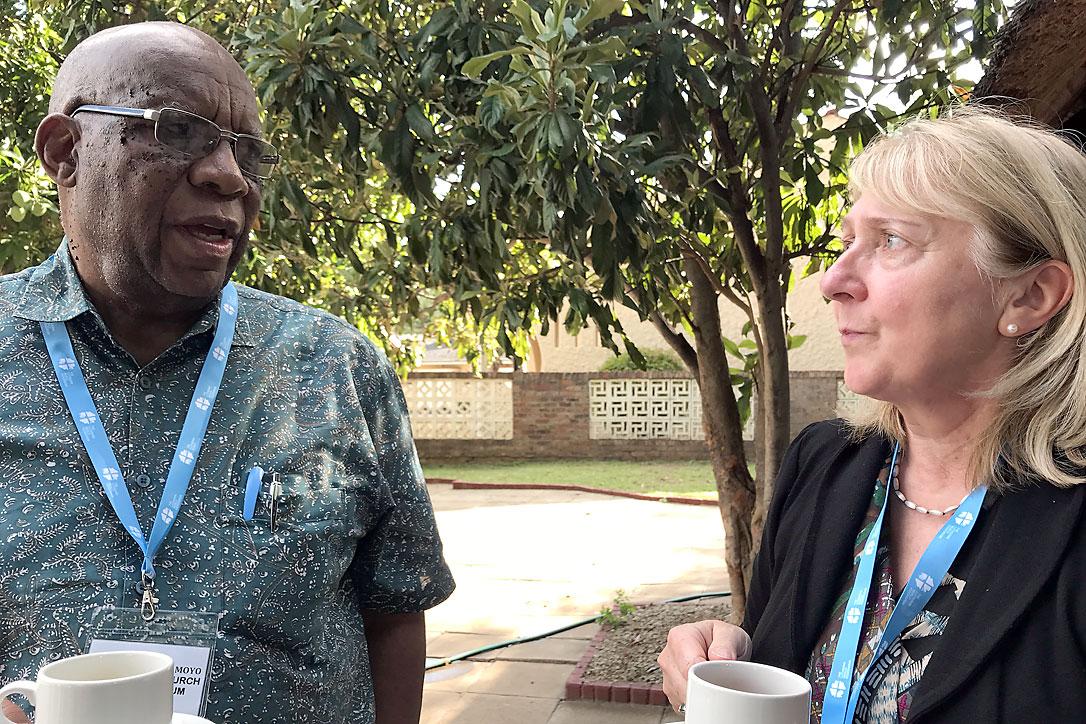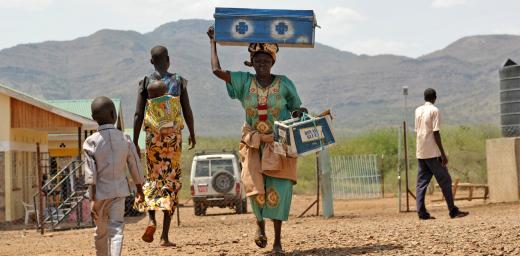Create a space to address pain and suffering

Bishop emeritus Ambrose Moyo, Zimbabwe and Dr Martina Fischer, Bread for the World, Germany. Photo: LWF/I. Benesch
Consultation in Zimbabwe calls for strengthened church capacity for peace building
(LWI) - Religious leaders and peace building practitioners should be actively involved in peace building processes. That was the conclusion of a recent consultation on the role of religious actors in peace building, 7-9 December 2016, in Kadoma, Zimbabwe.
The consultation was co-hosted by the Lutheran World Federation (LWF) and the Zimbabwe Council of Churches and attended by 30 participants from ecumenical bodies, peace building practitioners and civil society organizations.
In his presentation on the history of conflict in Zimbabwe, Bishop emeritus Ambrose Moyo addressed pre-colonial ethnic strife, colonization and the current socio-political situation in Zimbabwe. “If communities do not address past acts of violence, they cannot constructively work toward bringing about peace and justice in local communities,” said Moyo.
Speak out against culture of violence
In the context of rural Zimbabwe, where young women can be forced into marriage and corporal punishment remains prevalent in homes and schools, the church needs to speak out against this culture of violence. Participants agreed that the church should create a space to address pain and suffering and enable processes of healing and reconciliation.
In a joint communiqué, participants of the consultation noted “with concern reported cases of abduction and the use of violent force against protesters, which manifests the current political polarization as Zimbabwe moves towards the general election in 2018.” Analyzing the causes of violence and addressing wider institutional issues are crucial if today's fragmented society wants to become one nation, they said.
The peace office coordinator of the Ethiopian Evangelical Church Mekane Yesus, Eyob Yishak, described the current political situation in Ethiopia and called on the churches to maintain a healthy distance from the state so that they are able to speak out on violence perpetrated against citizens.
Religion to play positive role
Giving examples from the conflict in Bosnia, Dr Martina Fischer, a peace researcher at Bread for the World, Berlin, Germany, pointed out that religion can play a positive role in the transformation of conflict. She underlined that specific religious actors had consistently and convincingly worked towards establishing and solidifying interreligious relations.
She also warned against religion being compromised: “When religious actors have been implicated in a conflict, it becomes difficult for them to play a constructive role in building peace. Therefore, it is imperative to strengthen the religious communities’ critical capacity to withstand being instrumentalized.”
Dr Paul Deouyo explained how the LWF World Service country program in Cameroon establishes local peace committees to address conflicts between refugees and the host communities. This is an attempt to prevent the conflict from being exacerbated by negative, mutual stereotyping.
Participation of the most vulnerable
One of the consultation's concerns was how women and youth, often the most vulnerable in society, are affected by conflict. Since they are often not included in governance in church and society, their concerns are frequently ignored. The church can set a positive example by enabling the full participation of women and youth.
Consultation participants agreed that in order for the church to be an effective agent for transformative change, there is need for capacity building that enhances skills for conflict analysis and understanding the root causes as well as the underlying social, political and economic dynamics that trigger and perpetuate conflict. As Bishop Moyo underlined, “a comprehensive approach to peace building must be inclusive in terms of participants, be genuine in terms of objective and non-partisan.”
Empowered by Christian faith
In light of Human Rights Day, Rev. Dr Kenneth Mtata, general secretary of the Zimbabwe Council of Churches, emphasized that human rights need to be communicated in ways that resonate with the church. “The Christian faith empowers people to be guided by values such as love and respect for the dignity of all. It enables the church to build relationships of trust while being critical toward the undue use of power.”
If the church wants to engage successfully with the wider public, there is “a need to develop both sound theological reflection on violence and peace as well deepen the understanding of conflict transformation and human rights, “ stressed Rev. Dr Simone Sinn, study secretary for public theology and interreligious relations at the Lutheran World Federation.





